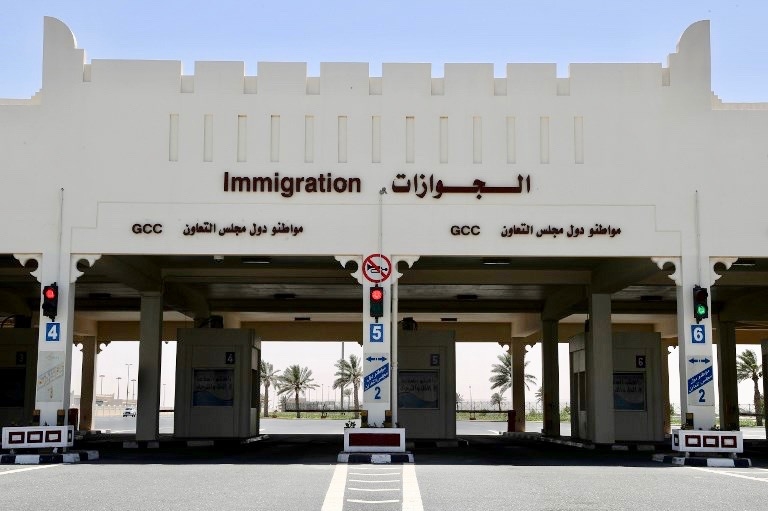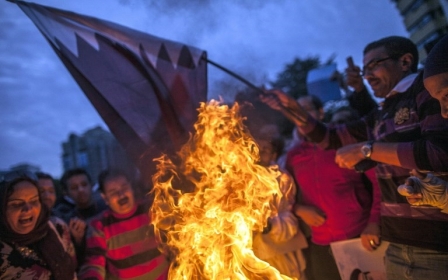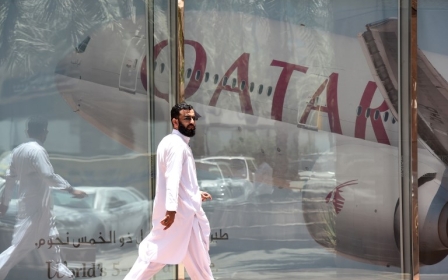Authoritarian absurdity and the Gulf's new 'normal'

The much-awaited list of demands from the countries that have imposed a blockade on Qatar is finally out. Yet, this list merely represents a transition by these blockading Arab countries from a state of insanity to one of absurdity amid this latest row.
The 13 items included in the list include provisions from requiring Qatar to close all its affiliated media organisations, starting with Al Jazeera, to closing down the Turkish military base in the country, downgrading diplomatic relations with Iran and expelling any opposition figures from the aggressor countries.
No self-respecting sovereign country would accept any of these demands, for they require Qatar to do away with the ideas of statehood and of sovereignty
Any sane person will immediately recognise that the list of demands handed to Qatar was not meant to be accepted. Rather, it appears that it was designed to trigger rejection, as the meaning of these demands is simple and straightforward: the full capitulation of Qatar to the blockading Arab counties. Therefore no self-respecting sovereign country would accept any of these demands, for they require Qatar to do away with the ideas of statehood and of sovereignty.
It isn't only that this list is irrational; it is also full of contradictions.
Do what we say, not what we do
The list asks Qatar to downgrade its diplomatic ties to Iran, despite the two countries sharing the world's largest natural gas field between them, while all the blockading countries except Saudi Arabia enjoy diplomatic ties with Iran. Saudi Arabia itself cut diplomatic ties with Iran only after Iranian protesters attacked Saudi diplomatic missions following the Saudi execution of Shia cleric Nimr al Nimr last year.
Likewise, the UAE is second only to China in terms of Iran's foreign trade. In fact, Iran enjoys flourishing economic relations with the UAE.
In a similar vein, while the list asks Qatar to shut down the Turkish military base, the UAE hosts a French military base and Bahrain a permanent British Royal Navy base, putting aside the curious fact that these countries have not dared to ask Qatar to shut down the American military base on its soil.
This crisis, in one way or another, will create new opportunities for Iran to make further inroads into this sub-region
The question that then follows is why these countries have put forward such an illogical list of demands, which has only further undermined their credibility and raised obvious legitimate questions about the motivations behind this blockade.
There appear to be three plausible explanations for such a preposterous list. First, as was the case with these countries' so-called terror list, the blockading countries may have prepared this latest demands list in considerable haste, particularly after the US State Department's criticism of them for their failure to put forward a list of demands or grievances. Yet, in the same statement the State Department asked these countries to put forward a "reasonable, actionable and fact-based" list.
The demands presented are neither reasonable nor actionable nor fact-based. One thing this list has clearly illustrated is that the motivation behind the blockade is neither about terrorism nor Qatar cozying up to Iran, as protagonists of this move have claimed.
These two points have served as window-dressing or as legitimising factors for other, less noble demands, which are the stifling of a free press, the wiping clean of the last remnants of the Arab Spring and the spirit and mindset that it represents, and a complete crackdown on the Muslim Brotherhood network, which isn't on a single Western country's terrorist list.
Gulf's new 'normal'
The second explanation is that these countries consciously prepared such an unreasonable list to make sure that Qatar would not be able to fulfill it, and that hence the crisis would continue and become the Gulf's new "normal". This means that the crisis has an instrumental value for the main protagonists of this blockade. To be more explicit, the crisis has instrumental value for Mohammed bin Salman of Saudi Arabia or Mohammed bin Zayed of Abu Dhabi.
The foundations of this utilitarianism vary depending on the calculations of the major actors involved. For instance, this new normal may help Salman complete his power consolidation within Saudi Arabia without much fuss, whereas bin Zayed may utilise the same normal to further eradicate any remaining opposition, be they individuals or groups, to the country’s archaic rule. The combined impact of this new normal is that it strives to usher in a region-wide authoritarian status quo.
To put it bluntly, Saudi Arabia is likely to end up as a geopolitical loser in this crisis
All in all, the utility of this new normal is clear. In this scenario, it is plausible to expect a further escalation of the crisis before it stabilises at a certain point. And the longer the stalemate continues, the more intractable both the problem and its solution will become.
The third explanation is that the blockading actors aim to use these unreasonable and maximalist demands as a bargaining chip or a starting point in the negotiation before they reveal the points that matters for them the most. Still, these demands are too maximalist and unreasonable to serve even as a starting point.
In any case, we are far from any breakthrough in the crisis. Of these scenarios, the second, plus aspects of the first and third, seems to be the most plausible. Thus, no solution is in sight for the foreseeable future.
Self-defeating
Putting aside possible driving factors, the illogical nature of this list of demands and the condescending attitude of the blockading countries shouldn't deceive us about the strength of their position. The demands, coupled with the erratic and impulsive nature of the leaders of the blockading countries, illustrate the callousness or short-sightedness of these countries when it comes to the reading of the larger geopolitical power play that is taking place in the region.
A closer examination of the positions of the main protagonists of this blockade, particularly Saudi Arabia, reveals how self-defeating this stance has been and will become for them.
Gone are the lofty goals of further cooperation and cohesion amongst the GCC countries
To put it bluntly, Saudi Arabia is likely to end up as a geopolitical loser in this crisis. Firstly, as traditionally powerful Arab states including Egypt, Iraq and Syria are mired either in civil strife or domestic political disorder, Saudi Arabia was presented with the opportunity to play the leading role in the Arab World.
In this latest crisis, Saudi Arabia isn't playing a leading role in the Gulf, let alone the wider Arab world. It is sharing its leadership role with the UAE in a limited part of the region. This action hasn't just further fragmented the Arab world and the Gulf, but it has also opened the Gulf, an area that Saudi Arabia sees as its natural sphere of influence, to further outside penetration. This crisis, in one way or another, will create new opportunities for Iran to make further inroads into this sub-region.
At best, the very existence and structure of the Gulf Cooperation Council (whose members are Bahrain, Kuwait, Oman, Qatar, Saudi Arabia and the UAE) will emerge considerably damaged from this crisis. Gone are the lofty goals of further cooperation and cohesion amongst the GCC countries, which would have naturally strengthened the geopolitical standing of Saudi Arabia in the larger region.
Not only Qatar, but the Omanis and Kuwaitis are probably looking at this drama with alarm and seeking ways for hedging their options away from the Saudi-Emirati bloc.
Map of fear
Likewise, in spite of all the courting, blackmailing and bribing by Saudi Arabia, the UAE and Egypt, this consortium has failed to convince most of the major countries in the Maghreb, Mashreq and Africa to either sever their ties to Qatar or sanction it.
None of the major powers in the Mashreq joined the blockade either. The same goes for Africa.
Putting aside Egypt and the non-recognised Haftar administration in Libya, no other major North African countries have joined the blockade. Likewise, none of the major powers in the Mashreq joined the blockade either. The same goes for Africa. Neither Sudan, a country that took part in the Saudi-led coalition in Yemen, nor Somalia, a country that heavily depends on foreign aid, have given in to Saudi-Emirati pressure.
Looking at the map of the countries that have either severed ties with Qatar or joined the blockade, there are two clear features.
First, this map represents the countries that have been frightened by the Arab Spring phenomena and the idea of region-wide change. Second, the same map also describes the list of countries whose leadership has been either completely bought by or bribed by the Saudi-UAE alliance.
Furthermore, since the onset of the Gulf crisis, Turkey has tried to tread a fine line between adopting a clear pro-Qatar position and avoiding appearing to take an anti-Saudi position. To that effect, it even attempted to mediate between the sides, though to no avail, and later supported the Kuwaitis' mediation efforts. Through such a role, Turkey was hoping to reposition its geopolitical standing beyond factional, ideological and political divides of the region.
Even in its criticisms, it was the UAE rather than Saudi Arabia that attracted the wrath of Ankara. But with Friday's list of demands, Turkey will have a hard time to continue treading this thin line, as the second item on this demand list asks Qatar "to immediately shut down the Turkish military base, which is currently under construction, and to halt military cooperation with Turkey inside of Qatar".
This demand is unlikely to have any impact on Turkey–Qatari relations. If anything, it will further deepen the resolve of both countries in further military cooperation. But if this demand, or for that matter other unreasonable demands, is pursued by the Gulf countries, it will inevitably further poison their relations with Turkey.
Saudi and the UAE's geopolitical blindness, as exemplified by this recent row, has undercut any attempt to balance Iran's deleterious regional policies or expansion
Last, opposition to Iran's geopolitical posturing has become a part and parcel of Saudi Arabia's geopolitical identity in the region. This hasn't only acquired a geopolitical colour, but also a very sectarian flavour as well.
Certainly, Iran's expansionist and largely sectarian regional policy has caused much destruction in the Middle East. Syria and Iraq are the prime examples of Iran's destructive regional policy. But Saudi and the UAE's geopolitical blindness, as exemplified by this recent row, has undercut any attempt to balance Iran's deleterious regional policies or expansion.
We are passing through times of authoritarian absurdity in the MENA region, which is ushering in a new regional normal, at least in the Gulf. This new normal will undeniably hurt Qatar. It will cost Qatar. Yet, the protagonists responsible for creating such a new normal will not emerge victorious from this feud, which is premised on a lose-lose logic. But sometimes, the bigger you are, the more you have at stake in the medium to long term.
- Galip Dalay works as a research director at al-Sharq Forum and senior associate fellow on Turkey and Kurdish Affairs at the Al Jazeera Centre for Studies.
The views expressed in this article belong to the author and do not necessarily reflect the editorial policy of Middle East Eye.
Photo: Qatari side of Abu Samrah border crossing between Saudi Arabia and Qatar after blockade took effect (AFP)
Middle East Eye propose une couverture et une analyse indépendantes et incomparables du Moyen-Orient, de l’Afrique du Nord et d’autres régions du monde. Pour en savoir plus sur la reprise de ce contenu et les frais qui s’appliquent, veuillez remplir ce formulaire [en anglais]. Pour en savoir plus sur MEE, cliquez ici [en anglais].





